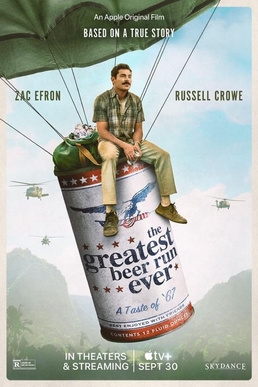beer-errant
Noun / Adjective | /ˈbɪəɹ ˌɛɹənt/
ბირ-ერანტ
[modern neologism • mock-chivalric slang]
Definition
As a noun: A person who engages in quixotic conduct involving beer.
As an adjective: Describing bold, impractical, or idealistic behavior involving beer.
Etymology
From beer + errant (as in knight-errant, from Latin errare, “to wander”).
Example Sentences
- Everyone else stayed home and watched the news—he went full beer-errant and flew into a war zone with nothing but a duffel bag and a case of Pabst.
- There’s a fine line between bravery and being a beer-errant, and Chickie danced on it with every step through Vietnam.
- They called him a fool, but every beer-errant starts with someone saying it can’t be done.
- To be a beer-errant is to mistake sentiment for strategy—and do it anyway, grinning.
- It was a beer-errant scheme from the start: a map drawn on a napkin, a borrowed truck, and a promise made in a bar.
- The whole trip was beer-errant in nature—no plan, just beer, blind optimism, and a vague sense of purpose.
- He made a beer-errant vow to show up for every friend who ever bought him a drink, no matter the distance.
- His beer-errant logic was simple: if you care enough, you bring the beer in person—even to a battlefield.
The Greatest Beer Run Ever and the Beer-Errant Archetype
The Greatest Beer Run Ever (2022) is perhaps the most literal and sincere cinematic expression of the beer-errant: a figure who undertakes a quixotic journey involving beer, driven more by emotion than logic.
John “Chickie” Donohue’s decision to carry a duffel bag of Pabst Blue Ribbon into an active war zone reflects the core spirit of the term—bold, impractical, deeply personal, and rooted in misguided idealism.
Chickie’s beer-errantry is not heroic in the traditional sense. It lacks clear purpose, rational planning, or even consent from its intended recipients. What it possesses instead is raw sincerity: the belief that sharing a beer might bridge the gulf between home and war, civilian and soldier, life and death.
Rather than parody, the film offers a straight-faced case study: a person whose symbolic gesture, however absurd, becomes a vehicle for transformation. Chickie does not return triumphant, but altered—having followed through on a ridiculous mission only to discover something real beneath it.

Image credit: Film poster. Used under fair use for commentary and critical analysis.
beer-errant in The World’s End (2013)
The term beer-errant finds a natural embodiment in Gary King, the central figure of The World’s End. His doomed determination to complete the “Golden Mile”—a 12-pub crawl in his hometown—is a textbook act of beer-errantry: impractical, emotionally loaded, and carried out with a blend of nostalgia, denial, and misplaced heroism.
Though framed around beer, Gary’s journey is not about drinking per se, but about restoring a lost sense of self through ritualized excess. Like a knight-errant clinging to a code no longer relevant, the beer-errant clings to old narratives in defiance of present reality.
In this way, The World’s End functions as a darkly comedic case study of beer-errantry pushed to its limit—where the quest persists even when the world around it no longer exists.

Image credit: Film poster. Used under fair use for commentary and critical analysis.
Note: The term knight-errant derives from Old French chevalier errant, or “wandering knight.” It forms the linguistic and thematic foundation of beer-errant, preserving the idea of a quest driven by personal myth, but substituting beer for chivalry.
Related Terms
-
Pot-valiancy
Noun — Bravery or boldness brought on by drunkenness, especially of the foolish or reckless sort.
“He charged into the argument with pure pot-valiancy and no facts whatsoever.” -
Liquid courage
Colloquial Noun — Confidence gained from alcohol, usually temporary and unreliable.
“He only talked to his crush after a shot of liquid courage.” -
Quixoticism
Noun — Behavior driven by impractical idealism, especially when detached from reality.
“His plan to fix everything with one grand gesture reeked of quixoticism.”

.png)
: